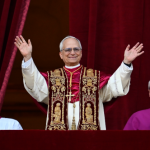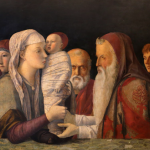WHAT A RESURRECTION REALLY FEELS LIKE: Some thoughts about a particular moment in philosophical and spiritual struggle where many people seem to get kind of stalled. I hope I can write about this without sounding like I think this describes everyone who considers himself or herself to be seeking and not finding. This is more like, “What I describe here may resonate with some of you,” not, “I know why you haven’t Seen the Light yet.”
So: Sometimes, especially when very philosophically-minded people talk about God or their hypothetical future-tense conversion, I think they may be confusing faith and spiritual consolation. They talk as if they accept the Catholic (I feel like I mostly see this with Catholic-symps) anthropology, the Catholic view of human nature and purpose. They talk, in fact, as if they’re pretty sure that the Catholic picture of human life would explain and add to their understanding of the world in a way which no merely secular philosophy could match. And yet they don’t “have faith,” which, the more they talk about it, sounds like it means that they haven’t had a direct experience of God’s presence. They haven’t had an encounter with the living God, at least not when they could recognize Him. So they are stuck, wandering around with this kind of zombie worldview, thinking maybe it will be brought fully to life one day by a bolt of God-lightning.
But a felt sense of God’s close, tender, sublime presence isn’t faith. I think the Catholic jargon for it is spiritual consolation, but I’m certainly open to correction there! A sense of total abandonment by God, total aloneness, is entirely compatible with unflinching faith. So is spiritual anomie or boredom or simple anticipation of a more visceral encounter with God.
I’d say that if you accept the Catholic anthropology, and you accept that if there is no God that anthropology doesn’t make sense, then you believe in God, even if you’ve never experienced anything you recognize as His presence.
One difficulty, of course, is that Catholicism, or any actual existing Christian tradition rather than the Buddy Jesus I make up in my head, is an ornate, shaggy, thoroughly weird religion. Because the Church corrects everyone, even the saints, She doesn’t fit entirely into anyone’s preexisting moral beliefs. So you may believe what you consider to be the biggest elements of the Catholic anthropology but not all the details, or you may entirely accept some major aspects of that anthropology and reject others. I think the goal then is to figure out which parts of your worldview do in fact require God, if any, and go forward from there.
A related difficulty is that reason and introspection necessarily intertwine here, because you’re often trying to figure out which of two or more alternatives you believe in most. To take an obvious example, I had to ask myself, in converting, whether I was more sure that gay sex was morally neutral or that the Catholic Church can teach authoritatively on matters of sexuality. Bizarrely, I was more sure of the second thing!, and so I accepted the Church’s teaching even though I didn’t (and often still don’t) understand it. On a less brass-tacks level, you might be asking yourself whether you’re more sure of your God-requiring anthropology, or that God doesn’t exist. If you’re more sure that God doesn’t exist, something is askew in your worldview. Here’s George Orwell on this very dilemma, though he tries to handwave it because for once he’s insufficiently hardcore.
If you do this introspection and find yourself shying away from an anthropology (or metaphysics, etc) you thought you held really firmly, that may be a sign of fear of commitment. It might not! You’ll know your own motives much better than I will. But I do think there’s a certain attraction in being always almost Christian: always Quizás Quizás Quizás.
I should note that this isn’t how I personally became Catholic. I did a lot of this “working on my underlying worldview through philosophy until I realized that the Catholic Church was scarily plausible,” and then I prayed for a couple of weeks, and then I had, in fact, a strange and tipsy spiritual experience which was essentially an encounter with God the Creator. I had a felt experience of objects in the world as words spoken by God. This was what I needed in order to get serious about starting RCIA. It was a fairly ramshackle and humiliating spiritual encounter (probably past the legal BAC, going all T.S. Eliot over a stain on a Yale bathroom wall) but it was an experience of the created world as infused with God’s presence.
So I do know that faith is more like a spectrum than an on-off switch, and someone can be moving toward deeper faith due to philosophy while still hanging back from full commitment because of uncertainty and a lack of felt experience of God. That’s basically what I did for a time. But I want to clarify that you can have genuine faith even in the absence of an “encounter”-like experience. I mean, your thoughts are also things you experience! Your practice of philosophy is experience. God may be encountering you through your friends (since philosophy is always best practiced among friends) rather than burning a bush at you or something. Let yourself believe what you believe, even if you don’t feel like a Christian.
To close us out, here’s a poem by Denise Levertov, which I think speaks to the situation. Via Wesley Hill.















